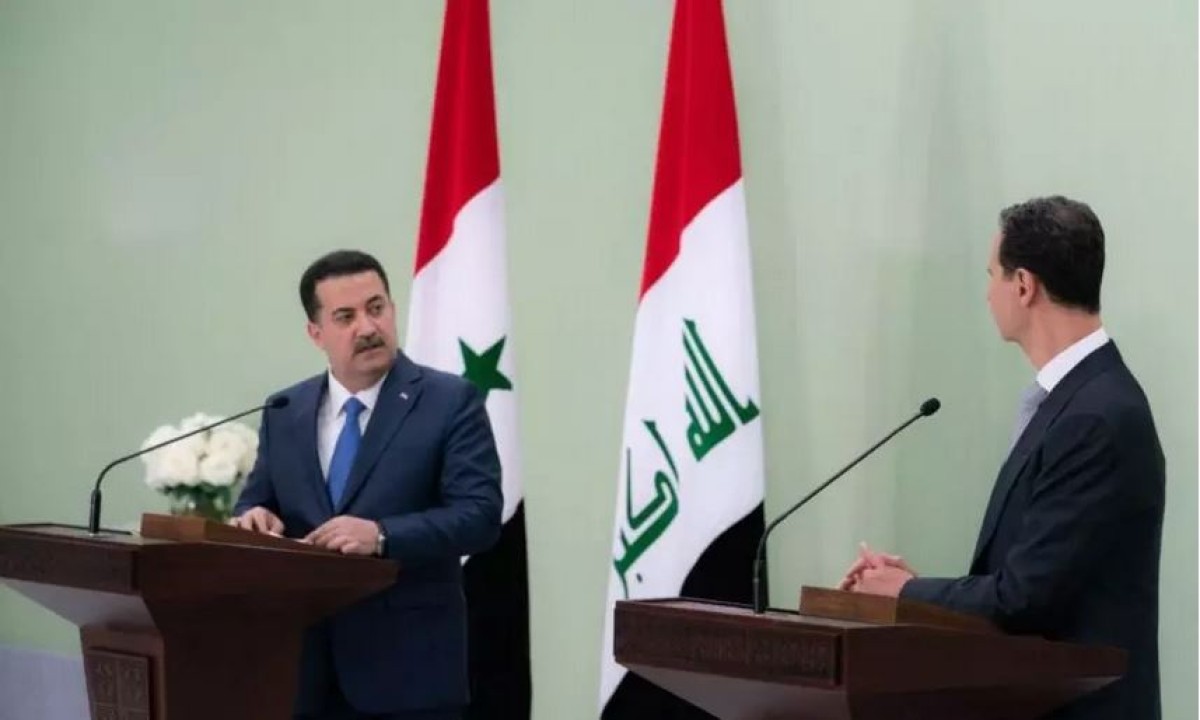 3180
3180
Iraq's Efforts to Mediate Between Turkey and Syria
Iraq's Efforts to Mediate Between Turkey and Syria
Over the past few months, the Iraqi government has been attempting to mediate between Turkey and Syria in an effort to improve Ankara's relations with Damascus. Continuing these efforts, Iraqi Prime Minister Mohammad Shia Al-Sudani recently confirmed in an interview with a Turkish TV channel and through an official announcement the country's mediation efforts between Syria and Turkey.
It is important to note that Ottoman Turkey and the Levant had a close and enduring relationship for centuries until Atatürk rose to power in Turkey. The demarcation of new Syrian borders by French colonialism led to the separation of these two countries. Post-World War II developments diverged Turkey and Syria onto different paths, leading to an increase in their distance over the years. Bilateral relations between Turkey and Syria have experienced numerous fluctuations, influenced by major disputes over the Kurds, the division of the Tigris and Euphrates water, and the territorial conflict over the Hatay region. The Justice and Development Party's rise to power in Turkey in 2002, under the leadership of Recep Tayyip Erdoğan, marked a shift in the country's regional foreign policy and a gradual improvement in relations with Syria. However, since 2011, Syria has been embroiled in internal crises and unrest. [1]Turkey's foreign policy response to these crises has ranged from mediation to intervention, with recent years seeing direct attacks and operations on Syrian soil, indicating clear interference in Syria's internal affairs.[2]
He notes that before Erdogan's 2022 U-turn towards Damascus, Turkey supported Syrian armed opposition groups fighting to overthrow the legitimate government of Assad. Prior to this change in Ankara's approach, Russia's mediation efforts to restore relations between these two neighboring countries had failed. [3]However, after Erdogan's apparent change of position and the initial efforts made in the region, we see that Iraqi Prime Minister Mohammad Shia al-Sudani, in a conversation with the media, mentioned contact with Syrian President Bashar al-Assad and Turkish President Recep Tayyip Erdogan. Turkey has mentioned efforts to create reconciliation and added that, "God willing, we will soon see measures taken in this regard." Turkish media, citing official Iraqi sources, claimed that the Iraqi government, as part of its efforts to reconcile Syria and Turkey, has made arrangements to host the officials of the two countries for a direct meeting. This meeting will be held in Baghdad soon.[4]
But, on the other hand, in parallel with the reported news, a high-ranking official in the National Security Council of Iraq has also confirmed these efforts. He stated, "The Syrian government does not show much enthusiasm for this mediation, but Iraq continues its efforts because this issue is in the interest of everyone, especially the security of the three countries." The reason for Syria's position is that it considers direct negotiations with Turkey in the current situation as "shortcoming Turkey without getting any concessions" and always seeks to set conditions for direct negotiations with Turkey that are above all related to the issue of the presence of Turkish forces on the ground. This is a stance taken by Syria, which now seems to be accepted and acted upon by Turkey. We are witnessing this as the Minister of Defense of Turkey, "Yashar Güler," has announced the review of the withdrawal of this country's forces from Syria.[5]
Considering the role of Iraq in improving relations between Iran and Saudi Arabia, it is essential for Iraq to replicate that success in facilitating reconciliation and direct dialogue between Syria and Turkey. By achieving this, Iraq can lay the groundwork for better relations between Turkey and Syria, ultimately enhancing its own political position in the region and strengthening its bilateral relations with Turkey. This is especially crucial in addressing the control of Kurdish terrorist groups in the Kurdistan region of Iraq, as agreed upon with Turkey, which could lead to disarmament and the cessation of their terrorist activities.
The potential success of Iraq in mediating between Turkey and Syria would result in the removal of the Syrian Democratic Forces (SDF), a group supported by the United States that currently controls parts of Syria. Al-Sudani emphasized that security threats in Iraq and Syria stem from areas in Syria outside of the Syrian government's control.[6] Eliminating the SDF from eastern Syria would allow the Syrian government to regain full control of the country and help Turkey address a significant security threat, while also securing the common border between Iraq and Syria.
In conclusion, it is worth noting that Iraq has a strong chance of success in mediating the situation. However, the fast-paced political changes and deep-seated tensions between the two countries, along with the influence of other nations in the region and globally, mean that Iraq's success ultimately hinges on the willingness of all parties to engage in dialogue, commit to negotiations, and demonstrate sincerity in their efforts.
[1] https://psiw.journals.ikiu.ac.ir/article_294.html
[2] https://www.aa.com.tr/tr/analiz/gorus-turkiye-irak-ve-suriyede-teroru-nasil-bitirecek/3180440
[3] https://ilkha.com/dunya/rusyadan-turkiye-suriye-iliskilerinin-normallesmesine-iliskin-aciklama-381828
[4] https://www.cumhuriyet.com.tr/dunya/turkiye-suriye-anlasmazliginda-irak-arabuluculugu-yetkililer-2214875
[5] https://irna.ir/xjQJK3
[6] https://fa.alalam.ir/news/6878003/%D9%85%DB%8C%D8%A7%D9%86%D8%AC%DB%8C%DA%AF%D8%B1%DB%8C-%D8%A8%D8%BA%D8%AF%D8%A7%D8%AF-%D9%85%DB%8C%D8%A7%D9%86-%D8%A7%D8%B1%D8%AF%D9%88%D8%BA%D8%A7%D9%86-%D9%88-%D8%A7%D8%B3%D8%AF%D8%8C-%D9%88-%D8%B3%D9%86%D8%A7%D8%B1%DB%8C%D9%88%D9%87%D8%A7%DB%8C-%D9%BE%DB%8C%D8%B4-%D8%B1%D9%8
 3180
3180
Comment
Post a comment for this article